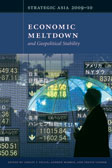Source: The National Bureau of Asian Research
 Co-edited and introduced by Ashley Tellis, with chapters by leading Asia specialists including Peter Bottelier, non-resident scholar at the Carnegie Endowment for International Peace, this book, the ninth volume in NBR’s Strategic Asia series, analyzes the impact of the current global economic crisis on key Asian states and explores the strategic implications for the United States. Through a combination of country, regional and topical studies, leading experts examine the potential effects of the crisis on the economic performance and strategic goals of various Asian states and the resulting implications for the larger balance of power, both regionally and globally.
Co-edited and introduced by Ashley Tellis, with chapters by leading Asia specialists including Peter Bottelier, non-resident scholar at the Carnegie Endowment for International Peace, this book, the ninth volume in NBR’s Strategic Asia series, analyzes the impact of the current global economic crisis on key Asian states and explores the strategic implications for the United States. Through a combination of country, regional and topical studies, leading experts examine the potential effects of the crisis on the economic performance and strategic goals of various Asian states and the resulting implications for the larger balance of power, both regionally and globally.
Order this book, or read the introduction by Ashley J. Tellis for free.
About the Editors:
Ashley J. Tellis, Senior Associate at the Carnegie Endowment for International Peace and Research Director of the Strategic Asia Program at NBR, served in the U.S. Department of State as senior adviser to the Undersecretary of State of Public Affairs, and previously as senior adviser to the Ambassador at the U.S. Embassy in India. He also served on the National Security Council Staff as special assistant to the President and senior director for Strategic Planning and Southwest Asia. He is the author of India’s Emerging Nuclear Posture (2001) and co-author of Interpreting China’s Grand Strategy: Past, Present, and Future (2000), as well as the co-editor of six most recent volumes of Strategic Asia, published by NBR.
Andrew Marble is the Editor at the National Bureau of Asian Research.
Travis Tanner is the Senior Project Director and Director of the Pyle Center for Northeast Asian Studies at the National Bureau of Asian Research.
